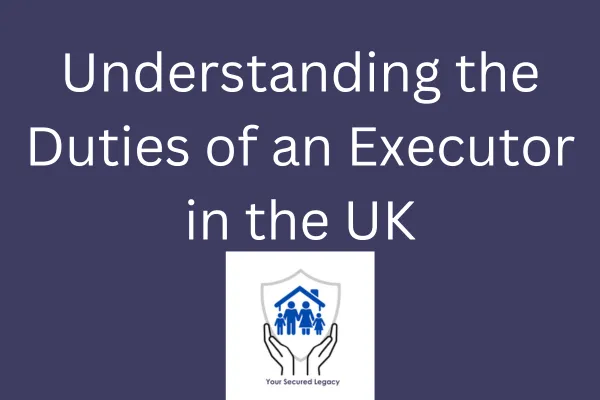
Understanding the Duties of an Executor in the UK
Understanding the Duties of an Executor in the UK
If you've recently been named an executor of someone’s will in the UK, you might feel honoured—but also a little overwhelmed. That’s completely normal! An executor plays a crucial role in making sure a person’s final wishes are carried out and their estate is managed properly after they’ve passed away.
Here’s a straightforward look at what being an executor involves.
1. Registering the Death and Locating the Will
First things first: the death must be registered (usually within five days in England, Wales, and Northern Ireland; eight in Scotland). After that, you’ll need to find the latest version of the deceased’s will. This document gives you the legal authority to begin handling their estate.
2. Applying for Probate
If the estate is worth more than a certain amount (typically £5,000–£10,000), you’ll usually need to apply for probate. This is a legal document that proves your right to deal with the estate. Without probate, banks and other institutions may not let you access funds or property.
3. Valuing the Estate
You’ll need to calculate the value of the person’s estate—including property, money, possessions, and debts. This is essential for probate and to determine if inheritance tax is owed.
4. Paying Off Debts and Taxes
Before any money is passed on to beneficiaries, debts (like credit cards or loans) and taxes (including any inheritance tax due) must be settled. As the executor, you're legally responsible for doing this correctly.
5. Distributing the Estate
Once everything else is in order, you can distribute the remaining assets to the beneficiaries named in the will. You should keep clear records of everything you’ve done in case any questions come up later.
6. Keeping Everyone Informed
Throughout the process, it’s good practice to keep beneficiaries updated—especially if things take a while (which they often do). This helps avoid misunderstandings and shows you’re handling things transparently.
Some of the responsibilities of being an executor come with inherent risks, if you get things wrong, mis-represent a fact or figure or miss a debt , you could be liable for the monies yourself. Being an executor can be a big job, but you don’t have to do it alone. Many people seek legal or professional advice—especially for larger or more complex estates. With some legal assistance, organisation, and support, you can carry out this important duty with confidence and care.
Andy at Your Secured Legacy is available for support and guidance with trusted legal advice to help you avoid the pitfalls.
